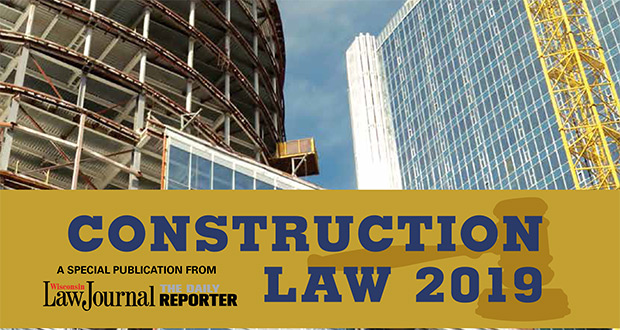Conditional Use: High court to weigh in on permitting dispute
By: Erika Strebel, [email protected]//January 25, 2019//
Conditional Use: High court to weigh in on permitting dispute
By: Erika Strebel, [email protected]//January 25, 2019//
When local officials placed additional insurance requirements on Enbridge Energy Co. in 2015 as part of granting a conditional-use permit for a pipeline project in northeast Dane County, company officials were quick to file an appeal.
Yet before that challenge could be settled, state lawmakers had separately passed a bill banning the imposition of such insurance mandates during the permitting process. Now the Wisconsin Supreme Court is being asked to decide which should take precedence: the new state law or the local insurance requirements?
At the heart of the case is a conditional-use permit that Enbridge Energy Co. had sought so it could increase the volume of crude oil that it pumps through an interstate pipeline traveling partly through northeast Dane County. The project would require the expansion of a pump station in the town of Medina.
A local zoning committee approved the permit in April 2015 after adopting 12 conditions, two of which were related to insurance.
Enbridge appealed the committee’s decision to the county board, specifically challenging the two insurance requirements. Before the county could take up the appeal, though, the state Legislature had adopted Wisconsin Act 55, which prohibits counties from requiring interstate-pipeline operators that already have comprehensive general-liability insurance to get additional insurance to cover things like bodily injuries and property damage resulting from accidental and sudden pollution.
After Act 55 had taken effect, on July 14, 2015, the Dane County zoning administrator responded to the new law by striking the two insurance conditions from the permit. But in September of the same year, officials on the zoning committee concluded it was in fact they who have the sole authority to modify the permit. They decided to retain the two insurance conditions but added a note stating the requirements were unenforceable as long as Act 55 remained in effect.
Enbridge responded by again appealing to the county board, which this time upheld the zoning committee’s latest version of the permit.
Enbridge then went, in January 2016, to Dane County Circuit Court to petition for a judicial review, asking the court to require the zoning committee and board either to remove the two insurance conditions or to declare them void.
That was far from the end of the legal wrangling. A month later, a group of landowners filed a lawsuit in Dane County, seeking an injunction that would enforce the two permit requirements.
The court consolidated the cases, and Judge John Albert ruled in 2016 that the two insurance requirements could not be included in the permit. Albert also noted that the landowners had filed no separate request for judicial review of the matter and, for that reason, had no right to challenge the county’s finding that Enbridge carried a proper general-liability policy.
The landowners and Dane County appealed Albert’s decision. In May, the Wisconsin Court of Appeals decided to reverse Albert’s orders and remanded the case to the circuit court, which was instructed to give the zoning committee another chance to arrive at a correct interpretation of Act 55.
Enbridge appealed to the Wisconsin Supreme Court, which took the case up in September.
Enbridge is arguing, among other things, that the justices should strike the two insurance conditions from the permit and find that the landowners had no authority to bring their lawsuit.
The county, on the other hand, contends the Court of Appeals correctly sent the matter back to the zoning committee.
The landowners agree with the county that the dispute should be sent back to the zoning committee and contend that state statute grants them the right to enforce the terms of conditional-use permits.
Both the county and the landowners are arguing that Act 55’s insurance limits do not apply to Enbridge because Enbridge hasn’t shown that it has bought the sort of general liability insurance with pollution coverage required by Act 55. Enbridge, in contrast, contends that it has in fact furnished proof of such a purchase.
Both the state of Wisconsin and Wisconsin Manufacturers and Commerce have filed briefs in the case.
Wisconsin Manufacturers and Commerce, for its part, is urging the court to strip the conditional-use permit of its insurance requirements. The group contends that local governments should not be allowed to flout a law passed by the state Legislature and that private citizens have no greater right than counties to enforce zoning ordinances.
Meanwhile, the state of Wisconsin is asking the Supreme Court justices to reject the Court of Appeals’ interpretation of the pipeline-insurance statute.
The state contends, among other things, that the appeals court’s interpretation of the pipeline-insurance statute was so narrow that it undermined the Legislature’s intent in enacting the statute in the first place. Such an interpretation, the state argues, would let local officials stall projects that are important to people living throughout Wisconsin.
Legal News
- Former law enforcement praise state’s response brief in Steven Avery case
- Eric Toney announces re-election bid for Fond du Lac County District Attorney
- Former Wisconsin Democratic Rep. Peter Barca announces new bid for Congress
- Republicans file lawsuit challenging Evers’s partial vetoes to literacy bill
- More human remains believed those of missing woman wash up on Milwaukee Co. beach
- Vice President Harris returning to Wisconsin for third visit this year
- Wisconsin joins Feds, dozens of states to hold airlines accountable for bad behavior
- Trump ahead of Biden in new Marquette poll
- Bankruptcy court approves Milwaukee Marriott Downtown ‘business as usual’ motion
- New Crime Gun Intelligence Center to launch in Chicago
- Arrest warrant proposed for Minocqua Brewing owner who filed Lawsuit against Town of Minocqua
- Wisconsin Supreme Court justices question how much power Legislature should have
WLJ People
- Power 30 Personal Injury Attorneys – Russell Nicolet
- Power 30 Personal Injury Attorneys – Benjamin Nicolet
- Power 30 Personal Injury Attorneys – Dustin T. Woehl
- Power 30 Personal Injury Attorneys – Katherine Metzger
- Power 30 Personal Injury Attorneys – Joseph Ryan
- Power 30 Personal Injury Attorneys – James M. Ryan
- Power 30 Personal Injury Attorneys – Dana Wachs
- Power 30 Personal Injury Attorneys – Mark L. Thomsen
- Power 30 Personal Injury Attorneys – Matthew Lein
- Power 30 Personal Injury Attorneys – Jeffrey A. Pitman
- Power 30 Personal Injury Attorneys – William Pemberton
- Power 30 Personal Injury Attorneys – Howard S. Sicula








